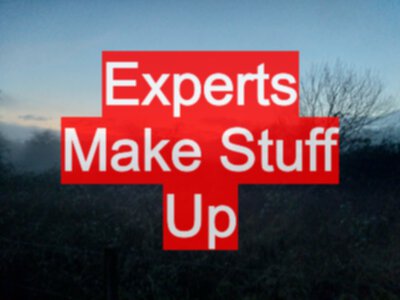TLDR; Experts do not know the answer to everything. They draw on all their experience and learning. They allow themselves to make something up that seems plausible and maps on to their understanding of how the system works. We all do that in our daily lives. Apply the same process to work.
Experts Do Not Know the Answer to Everything
A Thing I wish I had learned earlier, and I did learn this, and it took a little bit of time is… experts, make stuff up.
How do experts seem to know the answer to everything?
Well they don’t.
Experts base their answers on experience
They just make up an answer based on their experience, based on all the things they have been through, based on their understanding of the current system.
They make stuff up, they have the confidence of doing that because they have experience at the back.
So how? what are the tactics for being able to do these kind of things? To make stuff up? To make these kind of decisions without having that experience?
We all have experience, trust it
First, recognizing that you already have that experience.
You already have enough experience to build models of the system, to figure things out.
You have made decisions in the past. You have made stuff up.
All an expert does is have the confidence to make stuff up at the specific point in time where, and when, people need to hear it.
Now if you’re not super confident in your expertise, And no one really is because we’re not really experts , we’re just making this up. If you’re not super confident, what you can do is… test things out.
Test your idea of what to do
What is the simplest thing, the smallest, risk-free, or the smallest part of risk thing, that you can possibly do to test your idea of what to do next?
What is the smallest simplest thing you can try out?
That is one strategy for helping decide whether your already existing decision, that you made as an expert (who is not an expert, but is capable of just making stuff up), is a “good enough” type of decision to go forward.
Because really, all an expert does is think those things through in their head, prior to saying things. (Sometimes they do this ‘as’ they are saying things.)
We already have enough experience
You can build up the experience as you go through, you don’t have to know everything in advance, that’s really all that an expert is.
I had to learn that because I was in situations where people viewed me as an expert, and I had to come up with answers, so I did. And then I discovered I can come up with answers.
Prior to coming up with answers I thought there was some magic.
I asked a lot of people for advice. I wasn’t quite making the decision…
Stop.
- We have enough experience.
- We can make the decision.
- All experts make stuff up.
Recognizing that, allows you to be the expert that you need.
This was originally recorded on Racket in 202107
Follow on Notes
I was at a London Exploratory Workshop in Testing and remember saying, in response to someone else asking for advice: “You know, we all just make this stuff up.”
We all have a lot of life experience that is analogous to situations we find ourselves in at work.
We study other people’s experience reports. When we do, we can think through their report and consider: would I have done that? What would I have done differently? What information is missing in this report that would have caused me to make that same decision? What information is missing in this report that would have caused me to question this decision?
We are working with subjective ‘probabilities’. Giving yourself permission to be wrong is an important underlying aspect to making a decision. De-risk the decision by taking a small step that will allow us to ’test’ if the decision is suitable and feasible.
There will be areas where we will not have expertise, direct experience, or analogous experience. Don’t bluff it. At that point, find someone with real expertise, or go slower: experiment and study to develop the expertise.
When we are thinking through a decision, draw confidence by questioning it and noting what experience your decision is based on.
If we are giving advice to help someone make a decision, give advice that opens up their options, that builds on their strengths, that helps them achieve their goals, and is feasible for them. If we don’t know their: options, strengths, goals, capabilities then part of the advice process is asking questions to find out. Advice is contextual to them, not what we would impose in the situation.
When we give advice, consider both the pros and cons from your experience and models. We don’t just say “do this because…”, we also say “well, if you do that then…”. Giving Advice is an information gathering and questioning process that harnesses all the skills that we use internally for our decision making process.
Making decisions is a skill, that improves with practice. The hardest part is that we first have to decide to develop it.







